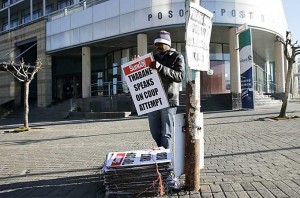Mikaila Rodgers
Intro to Contemporary African Studies
September 2, 2014
Yesterday, September 1, 2014, it was reported that Lesotho’s prime minister, Tom Thebane has fled the country to seek refuge within South Africa. He claims that Lesotho’s military, which has allegedly been influenced by deputy Prime Minister, Mothetjoa Metsing, has carried out a plot to overthrow the government. Reports have come out of Lesotho of police fleeing the country after being attacked by the country’s own military. Police weapons and uniforms have been detained by armed forces. The “coup” has allegedly been the consequence of the decision of Thebane to suspend parliament due to his improbable reelection. As a result of the tumult, two million citizens are left bewildered, stocking up on food and other supplies in apparent preparation for a lengthy political standoff. However, according theguardian.com, Lesotho has consistently experienced coups such as this one in previous years, following its independence from Britain in 1966. Deputy Prime Minister, Mothetjoa Metsing, claims to have no involvement in the coup. The military also admits no wrongdoing, arguing that the attack only came as the result of police attempting to arm “political fanatics” in a protest. Both groups are currently consulting with the South African president, Jacob Zuma. In addition, Thabane called on the fifteen-nation Southern African Development Community (SADC) to send peacekeeping troops to Lesotho. South Africa’s response to the crisis in Lesotho was chillingly lackadaisical.
“Police stations were deserted but Harris Majeke, South Africa’s high commissioner to Lesotho, denied that there had been a breakdown of law and order. “There is no problem in Lesotho because the government is still in place,” he told eNews Channel Africa. “There’s no violence. It’s business as usual,” (TheGuardian)
However, while South Africa seems to recognize no crisis, The United Nations has voiced its concerns, calling for a reinstallation of democratic rule.
The article in TheGuardian describes Lethoso as having always been “coup-prone”, due to its small size and feeble power. There is an ongoing battle for political power that has lasted from 1966 until present day. Lesotho’s most recent coup followed a seven-year military rule of the country until 1993. Going off of its description of Lesotho as being a “coup-prone” country, TheGuardian proceeds to paint a picture of the country as being violence-ridden. The author uses words like fear, impoverished, rupture, power struggle, and many more that would infer that the political issues in Lesotho are not fixable. Frankly, the article uses intense rhetoric that implies that Lesotho is a country in need of saving (as is implied in many articles involving African countries). The end of the article does not even imply that there is hope for the country. “Thabane told the BBC he would return to the country ‘as soon as I know I am not going to get killed’” (TheGuardian).The country is painted as a savage inhabitance, wherein action is demanded urgently in light of the strong emotional appeal utilized in the article.
Link to article: http://www.theguardian.com/world/2014/sep/01/lesotho-tom-thabane-south-africa

